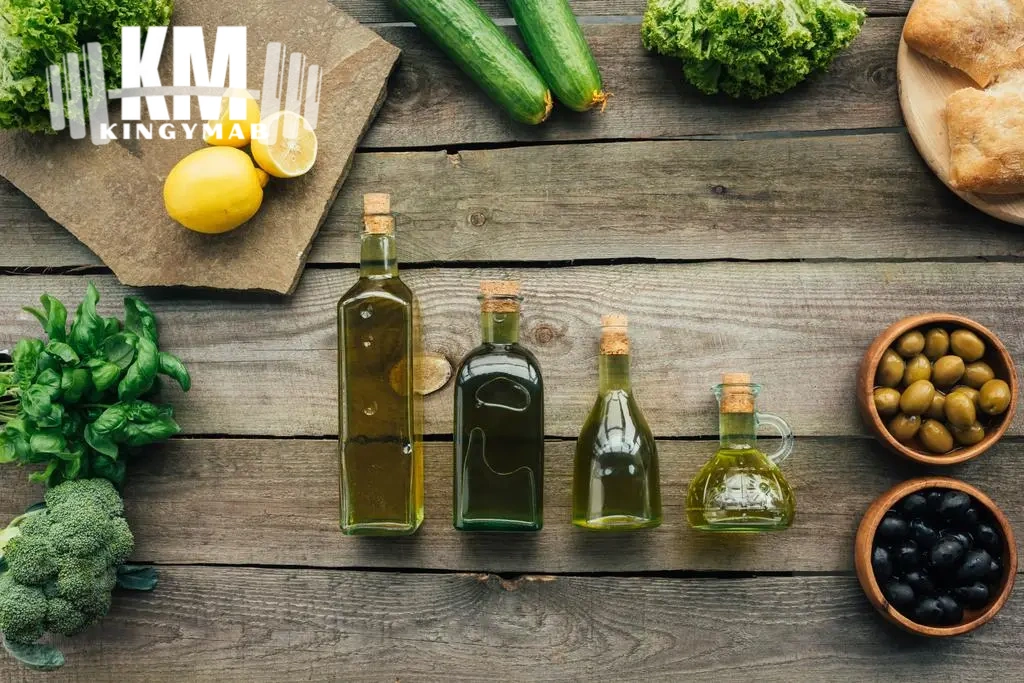Key Takeaways
- Olive oil, especially polyphenol-rich varieties, offers numerous health benefits.
- Regularly consuming olive oil can improve your heart health, skincare, and digestion.
- This article is based on existing research and aims to provide practical advice on using olive oil in everyday cooking.
- Learn how to choose the best type of olive oil and integrate it into your meals for optimal results.
Olive oil offers numerous health benefits, including improved heart health by enhancing HDL and reducing LDL cholesterol. It supports brain function, reduces inflammation, and provides antioxidants. Regular consumption is linked to a lower risk of heart disease, strokes, and cognitive decline, promoting overall well-being and longevity.
Why Olive Oil Is a Powerhouse Ingredient
Olive oil has been celebrated for its nutritional benefits for centuries. It’s a staple in the Mediterranean diet, known for its role in promoting heart health and longevity. But why Is this oil so special? This is primarily because of the polyphenol rich olive oil , a natural compound that acts as an antioxidant. Healthline states these antioxidants can protect your body from cellular damage and play a significant role in fighting various diseases, including heart disease, cancer, and inflammatory conditions. Free radicals are unstable substances that might eventually cause harm to your cells. They neutralize them. This preservation of cellular health is one of the primary reasons olive oil is highly regarded in nutrition.
Heart Health Benefits
One of the most significant advantages of consuming olive oil is its positive effect on heart health. As per the American Heart Association, olive oil can boost good cholesterol (HDL) and lower bad cholesterol (LDL) levels, which is essential in reducing the risk of heart disease. Studies indicate that incorporating a high amount of olive oil Your diet reduces the likelihood of experiencing heart attacks and strokes. In olive oil, monounsaturated fats, particularly oleic acid, help maintain healthy arterial function and lower blood pressure. These benefits make olive oil a reliable choice for those looking to support cardiovascular health, especially when substituted for less healthy fats and oils.
Improves Skin Health
Aside from its internal benefits, olive oil also works wonders for your skin. Polyphenol-rich olive oil can help reduce inflammation, which is known to cause various skin issues and promote smoother, more youthful skin. According to WebMD research, olive oil can help make the skin more elastic and hydrated while reducing age indicators like wrinkles and fine lines. This is mainly because the oil may absorb deeply into the skin, giving required antioxidants and vital fatty acids where they are most needed. Due to its gentle properties and effectiveness in locking in moisture, many people also use olive oil as a natural moisturizer and a remedy for conditions like eczema and psoriasis.
Aids Digestion
You might be shocked to hear that olive oil can resolve gastrointestinal problems. Because of its anti-inflammatory qualities, those with digestive issues, including acid reflux, indigestion, and even certain ulcers, can benefit from its soothing effects on the digestive system. Including olive oil in your diet can promote a healthier gut by fostering the growth of good bacteria, which is essential for optimal digestion and nutrient absorption. The colon’s mucous lining is lubricated by olive oil, facilitating food passage and preventing constipation. Furthermore, the availability of oleic acid and other nutrients facilitates the release of digestive enzymes, improving your digestive system’s overall effectiveness.
How to Choose the Best Olive Oil
Not all olive oils are created equal. When selecting an olive oil, look for extra virgin cold- pressed varieties. These types retain the most beneficial polyphenols and are the least processed, ensuring you receive the maximum health benefits. Additionally, there is a lower chance of extra virgin olive oil diluting with other oils, which might lower the oil’s nutritional value. Avoid oils labeled “pure”or”light” as they are usually refined and lack the same nutritional value and flavor. Also, please note the packaging; oil in dark glass bottles are shielded from light exposure, which might deteriorate its quality over time.
Consider checking for labels like “organic” or “PDO/PGI” (Protected Designation of Origin/Protected Geographical Indication), which further guarantee the oil’s quality and authenticity.
Simple Methods for Including Olive Oil in Your Diet
- Salad Dressings: To enhance the taste of any salad, try mixing olive oil with lemon juice, balsamic vinegar, or apple cider vinegar to make a quick and delicious dressing. Herbs like thyme, basil, and oregano can make a tasty and nutritious dressing.
- Sautéing: Use olive oil as a base for sautéing vegetables, lean proteins like chicken or fish, and even tofu. Due to its high smoking point, extra virgin olive oil retains its nutritious content through various culinary methods.
- Baking: Use olive oil instead of butter or other oils in baking recipes for a healthy choice. Olive oil works well in cakes, muffins, and bread, adding a moist texture and unique flavor.
- Marinades: To make a tasty marinade for meats and vegetables, mix olive oil with garlic, rosemary, thyme, and other spices. The oil helps to infuse the flavors deeply while tenderizing the meat.
Conclusion
Olive oil has several health advantages, including helping with digestion, skin care, and heart health. Choose high-quality, extra virgin, polyphenol-rich olive oil to get the most out of this potent ingredient. By including it in your meals, you can support a healthy lifestyle. Even minor dietary adjustments may greatly influence your general health and well-being.


